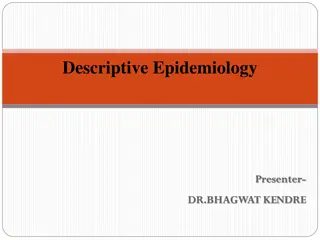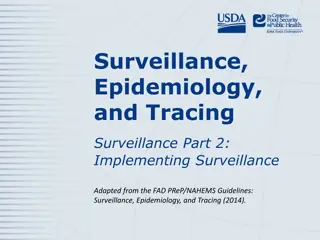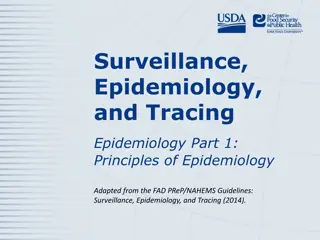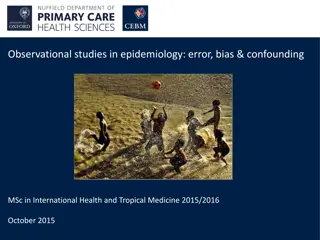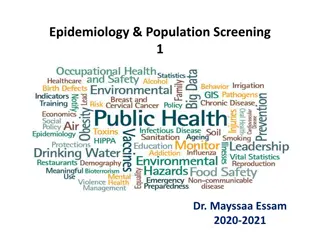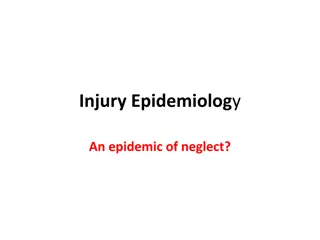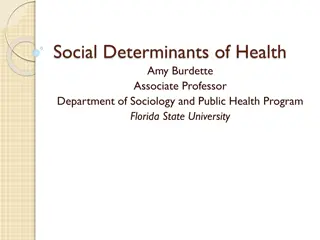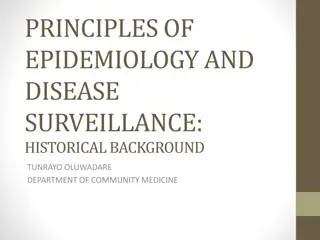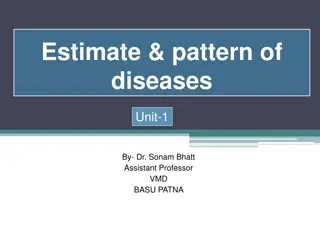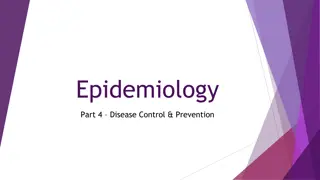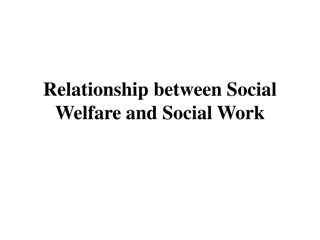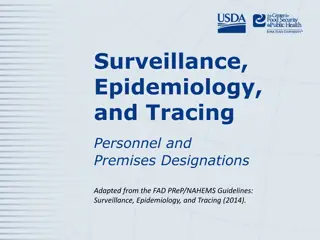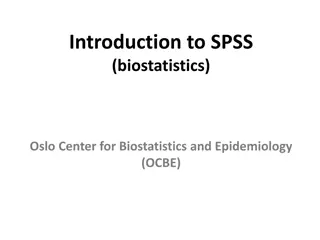Childhood Constipation: Approach and Epidemiology
Childhood constipation is characterized by hard stools, infrequent bowel movements, and other symptoms as per Rome IV criteria. It is a prevalent condition globally, with varying rates across different countries. Understanding the epidemiology and presentation of childhood constipation is crucial fo
0 views • 61 slides
Epidemiology of hepatitis C in Ireland
Hepatitis C, a viral infection affecting the liver, has notable implications in Ireland, with key transmission routes, clinical manifestations, and long-term consequences shaping its epidemiology. From transmission patterns to chronic infection risks, understanding the natural history and prevalence
0 views • 24 slides
Understanding Descriptive Epidemiology for Health Analysis
Descriptive Epidemiology, presented by Dr. Bhagwat Kendre, explores the distribution of diseases and related characteristics within populations. The study delves into factors like time, place, and person to identify patterns and formulate hypotheses about disease occurrence. Utilizing data from desc
3 views • 36 slides
Epidemiology of Periodontal & Gingival Diseases
Epidemiology is the study of disease distribution and determinants in populations for effective control and prevention. It plays a crucial role in understanding the prevalence, risk factors, and effectiveness of preventive measures for periodontal and gingival diseases. Classification systems and th
3 views • 63 slides
Implementing Surveillance in Epidemiology: Methods and Considerations
This presentation outlines sampling methods and considerations for implementing surveillance in epidemiology. It covers aspects such as sample types, sizes, random vs targeted sampling, and the comparison between the two approaches. The content provides insights into the practical aspects of surveil
1 views • 24 slides
Understanding Social Entrepreneurship, Social Enterprise, and Social Innovation
Social entrepreneurship involves creating sustainable social impact, social enterprises address challenges in critical needs sectors, and social innovation focuses on developing effective solutions to social and environmental issues. These concepts emphasize creating social value while engaging with
2 views • 19 slides
Principles of Epidemiology: Understanding Disease Occurrence and Surveillance
Epidemiology is the study of disease patterns, factors influencing disease occurrence, and the core functions of surveillance, field investigation, and analytic studies. It involves understanding disease characteristics, natural history, and evaluating the effectiveness of activities to mitigate dis
1 views • 25 slides
Understanding Observational Studies in Epidemiology
Delve into the realm of observational studies in epidemiology, exploring concepts such as error, bias, and confounding. Discover the significance of various study designs, from case reports to prospective cohort studies, in elucidating associations and establishing causality in non-communicable dise
0 views • 58 slides
Understanding Epidemiology: Disease Distribution and Population Health
Epidemiology is the study of disease distribution in populations, analyzing patterns, determinants, and risk factors to understand and control various health conditions. It encompasses infectious diseases like cholera, nutritional disorders such as scurvy, cancers like childhood leukemia, and non-co
1 views • 16 slides
Uncovering the Neglected Field of Injury Epidemiology
Exploring the realm of injury epidemiology, this content delves into the definitions, objectives, and hypotheses surrounding the study of injuries. It highlights the overlap between injury epidemiology and prevention while shedding light on why this field remains neglected, particularly in Canada. T
0 views • 70 slides
Overview of Ecological Studies in Epidemiology
Ecological studies in epidemiology involve studying groups of individuals at a population level to examine the correlation between exposure and disease occurrence. While cost-effective and useful for generating hypotheses, ecological studies have limitations, such as the inability to control for con
3 views • 21 slides
Understanding Social Determinants of Health
Chronic conditions like heart disease and cancer have multiple causes, not all biological. Social epidemiology studies the social distribution of health, morbidity, and mortality risk influenced by social status and conditions. Factors such as age, gender, race, socioeconomic status, and social cond
0 views • 32 slides
Understanding Malaria & Travel: Epidemiology, Etiology, and Prevention
Exploring the epidemiology and etiology of malaria with a focus on travel-related risks. Educational objectives include gaining knowledge on malaria transmission, prevention strategies, and the importance of seeking medical advice before traveling to endemic areas.
0 views • 62 slides
Understanding Myocarditis: Epidemiology, Pathogenesis, and Management
Myocarditis is an inflammatory heart condition with various causes, including viral infections and autoimmune responses. This article discusses the epidemiology, risk factors, pathogenesis, diagnosis, and management of myocarditis, highlighting the importance of differentiating it from pericarditis
1 views • 35 slides
Understanding Data Collection Techniques in Epidemiology
Explore the world of data collection techniques in epidemiology with Prof. Ashry Gad Mohamed from the College of Medicine. Learn about various methods, biases, ethical considerations, and the importance of combining different techniques for accurate research outcomes.
0 views • 45 slides
Understanding Epidemiology: A Historical Perspective
Epidemiology is the study of health and disease patterns in populations. It involves analyzing distribution, determinants, and risk factors to inform public health policy, disease prevention, and clinical work. Modern epidemiology traces back to the mid-20th century, focusing on observational studie
0 views • 16 slides
Evolution of Epidemiology: Historical Perspectives and Contributions
The evolution of epidemiology spans centuries, beginning with Hippocrates in 400 BC and progressing through key figures like John Graunt, James Lind, Edward Jenner, John Snow, and others. From the observation-based practices of ancient times to the groundbreaking experiments and analyses of the 17th
3 views • 20 slides
Understanding Disease Patterns in Epidemiology: Overview and Examples
Epidemiology is the study of health event distribution in populations. This includes analyzing disease patterns by time, place, and affected individuals. Diseases can be sporadic, endemic, epidemic, or pandemic, each with distinct occurrence characteristics. Understanding disease prevalence and inci
0 views • 9 slides
Understanding Disease Control and Prevention in Epidemiology
This article discusses disease control processes in epidemiology, including reducing disease incidence, duration, and transmission. It covers public policy interventions, elimination, eradication, and extinction of infectious agents. It also highlights preventable causes of disease and different lev
2 views • 10 slides
Overview of Acute Pyelonephritis: Diagnosis, Treatment, and Epidemiology
Acute pyelonephritis is a serious bacterial infection of the kidneys, leading to complications such as renal scarring and sepsis. This overview covers key aspects including epidemiology, etiology, clinical presentations, and risk factors. Diagnosis, treatment, and prevention strategies are also disc
0 views • 18 slides
Understanding Medical Social Work and Its Impact on Patient Well-being
Medical Social Work, also known as Health Care Social Work, plays a crucial role in addressing the social, physical, and psychological needs of patients. Through providing case work, after-care, and convalescence services, Medical Social Workers contribute to reducing hospital readmissions, preventi
0 views • 12 slides
Understanding Neuropsychiatric Syndromes in HIV Patients
This educational curriculum explores the role of psychiatry in enhancing outcomes for people living with HIV (PLWH) by addressing cognitive burden, psychiatric disorders prevalence, and appropriate psychopharmacology. Delving into the history, epidemiology, and psychiatry's role, the material covers
0 views • 57 slides
Epidemiology and Comorbidity at MRH Mthatha Regional Hospital by Dr. R. Kaswa
This presentation by Dr. R. Kaswa from the Department of Family Medicine and Rural Health at MRH Mthatha Regional Hospital covers the epidemiology, screening, testing, recoveries, mortality, and lessons learned from the COVID-19 pandemic. It provides statistics on COVID-19 cases, testing positivity
0 views • 24 slides
Objectives and Importance of Social Legislation for Social Workers
Social legislation is inspired by the constitution and aims to remove discrimination, safeguard rights of vulnerable groups, and eradicate social evils. It plays a crucial role in social welfare by providing a legal basis for addressing societal issues, enhancing community well-being, and facilitati
0 views • 4 slides
Understanding the Relationship Between Social Welfare and Social Work
Social welfare and social work are interconnected concepts aimed at enhancing societal well-being. Social welfare refers to a nation's system of programs and services meeting essential needs, while social work involves professional activities supporting individuals and communities in achieving socia
0 views • 6 slides
Guidelines for Surveillance, Epidemiology, and Tracing Personnel and Premises Designations
This presentation provides an overview of necessary personnel, incident command, planning sections, and premises designations based on the FAD PReP/NAHEMS Guidelines for Surveillance, Epidemiology, and Tracing. It covers topics such as the Incident Command System, Planning Section, and Operations Se
0 views • 22 slides
Understanding the Epidemiology of Disability and Its Impact on Health
Epidemiology focuses on studying disease causes, prevention, and control. Impairment, disability, and handicap are defined by the WHO. Impairment refers to loss or abnormality of function, disability refers to limitations in normal activities due to impairment, and handicap indicates social disadvan
0 views • 31 slides
Social Economy and Innovation in Emilia-Romagna Region
Emilia-Romagna Region in Italy highlights the importance of social economy and innovation for sustainable development. Various initiatives such as Social Cooperatives and Voluntary Associations contribute to the region's social well-being. The focus on social values and not-for-profit activities dri
1 views • 15 slides
Epidemiology of Smoking in Saudi Arabia
The Epidemiology of Smoking in Saudi Arabia is explored through the Saudi Health Interview Survey (SHIS), revealing that 12.1% of Saudis currently smoke tobacco, with varying prevalence across genders and age groups. The survey, conducted in 2013, provides insights into smoking patterns, daily consu
0 views • 24 slides
Understanding Hallux Rigidus: Anatomy, Biomechanics, and Epidemiology
Hallux rigidus is a condition characterized by the loss of motion in the first metatarsophalangeal joint, primarily in adults, due to degenerative arthritis and osteophyte formation. This article delves into the anatomy, biomechanics, epidemiology, and etiologies of hallux rigidus, shedding light on
0 views • 23 slides
Understanding Aquatic Epidemiology in Fish Populations
Aquatic epidemiology is a crucial branch of science that focuses on describing the health, diseases, and welfare of fish populations. It involves studying diseases in wild and hatchery-raised fish, identifying factors influencing disease occurrence, and conducting diagnostic investigations to mainta
0 views • 12 slides
Understanding Descriptive Epidemiology in Public Health
Descriptive epidemiology involves the study of disease occurrence and distribution in populations. It focuses on describing patterns of disease occurrence based on who gets sick, where rates are highest and lowest, and temporal patterns of disease. Descriptive studies are essential for public health
0 views • 18 slides
Introduction to SPSS Biostatistics Course at Oslo Center for Biostatistics and Epidemiology
This SPSS biostatistics course offered by Oslo Center for Biostatistics and Epidemiology (OCBE) is divided into three parts, covering descriptive statistics, continuous outcome variables, and binary outcome variables using data from the Caerphilly study. Participants will learn how to open datasets,
0 views • 52 slides
Understanding Malocclusion: Epidemiology, Terminologies, and Orthodontic Concepts
This comprehensive content delves into the epidemiology of malocclusion, covering determinants, distribution, measurement, prevalence, and global versus Indian scenarios. It explains key terminologies like overjet, overbite, and crossbite, along with concepts such as centric occlusion and orthodonti
0 views • 90 slides
Understanding Social Neuroscience: Exploring Human Sociality and Well-Being
Social neuroscience delves into how the brain processes social interactions and their impact on human well-being. It focuses on the interconnectedness between social connections and overall life satisfaction, suggesting that humans are inherently social beings with a strong need for social belonging
2 views • 21 slides
Social Entrepreneurship and Social Inclusion in Bulgaria
The development and implementation of social entrepreneurship practices in Bulgaria aim to promote social inclusion through the development of the social economy. The focus is on combining economic results with social objectives, managed transparently with measurable, positive financial value. Vario
2 views • 12 slides
Understanding Social Geography: Meaning, Scope, and Differences
Social geography is a branch of human geography focusing on social structures, groups, and activities. It examines the spatial arrangement of social phenomena, social differences, and patterns in understanding socially defined population groups. The scope of social geography includes analyzing spati
0 views • 25 slides
Approach to Poisoning in Children: Epidemiology, History, and Management
Epidemiology of poisoning in children, including common causes and age distribution, is discussed. The approach to poisoned children involves stabilization, targeted history taking, and examination to identify potential toxins and assess the severity of poisoning. Key aspects of history include onse
0 views • 51 slides
Effective Feedback Strategies for Grading in Epidemiology Courses
In teaching epidemiology courses, maintaining consistency in grading among multiple TAs is crucial. Providing high-quality feedback is essential as it builds the foundation for future learning. This article emphasizes the importance of effective feedback, tips for giving feedback, creating grading k
0 views • 12 slides
Understanding Cohort Studies and Disease Risk in Epidemiology
Cohort studies play a crucial role in epidemiology, allowing researchers to assess the relationship between exposure and disease risk. By describing different study designs, calculating risks, and understanding population at risk, valuable insights are gained to prevent adverse health outcomes. Risk
0 views • 37 slides


